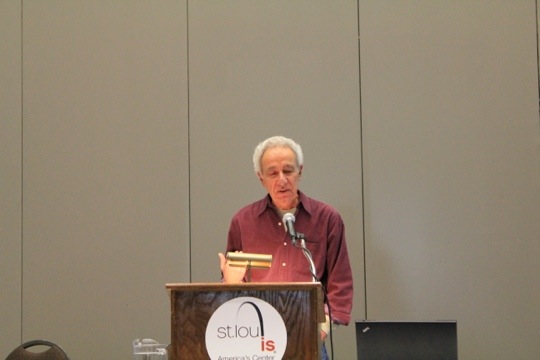Hannah Ashley began our session with Mike Rose with a very personal introduction about the influence Mike Rose had on her choices as a graduate student and her decision to focus on basic writing, developmental education, and issues of social justice. In graduate school, Hannah published an article citing Mike’s work. He e-mailed her about the article and it gave her the courage to pursue what has become her life’s work. I’m sure that Hannah’s wonderful story encapsulates how many of us feel about Mike Rose and his work. That Mike Rose took the time to write back to her about it is further testament to just how cool Mike Rose is. For how many of us has Lives on the Boundary or Mind at Work or some other Mike Rose book been a guide for those of us committed to basic writing and developmental education? I am certainly one of those former graduate students for whom Mike Rose’s writing served as a guide to the kind of work I wanted to do. I imagine most of us in the room could testify to the critical importance of Mike Rose’s work not just in our field but on our personal, professional decisions. Did I mention that he’s receiving the 2011 CCCC Exemplar Award? (During questions and answers, Bill Lalicker said that Mike signed his copy of Lives on the Boundary in a cowboy bar in Laramie, Wyoming).
So, it won’t surprise you that you want to be first in line at your local bookstore to purchase His new book. At our session today, Mike Rose shared the introduction his forthcoming book Back To School: Second Chances at Higher Ed due out in fall 2012. The new book focuses on the role of education in society as a second, third, or more chance at education. The book is a series of essays on higher education addressing issues like the critical importance of adult education. It raises critical questions about the debate between occupational training and college-for-all. Another essay addresses why so many adults hunger for education; students return for education certainly for work but also so they can read to their children and help them with homework and because they enjoy reading. Today, there are many opportunities, but they are also under attack. How do we work to protect these programs and the public institutions that offer a wider education than just occupational education? But how do we also think about the importance of providing vocational training students need while also providing intellectual breadth?
In the last 30 years, have you heard anything about education that wasn’t about economics? Even informed citizenry gets only a small nod. The really rich motives for education need to be addressed more. Rose began this question in Why School and continues it in this new book.
In the rich question and answer period, people raised questions and comments such as these:
So much education today is hopeful, trying to suggest that when we have high expectations for students, they do inspiring things, even when there’s a lot working against them.
The notion of “The People’s College” (the final chapter) is a challenge to fight to change perceptions of community colleges as places of failure instead of places for success & possibility.
The group also discussed Pima Community College and the trend to get rid of developmental education (trends in California and Connecticut). What happens when the cure contributes to the malady? Decisions are made on a legitimate concern, but have unintended consequences. Policy cures are far from the day-to-day realities of the classroom, the tutoring center, and other spaces for education.
The book and the conversation ended with a discussion of the learning society (the conclusion to Mike Rose’s new book) and the ways in which education can help students to “make things right.” These journey metaphors encapsulate the the ways students are focused on not just getting a job but living a better life, a life defined by a more complicated understanding of learning and education.
Rose shared “Mikey’s little theory” of cognitive momentum. For the students who make it and are successful, there comes a point when they are building this knowledge base and they can do things they couldn’t do before. There’s a body of knowledge and you can use it; all of a sudden you are able to solve problems with that new knowledge and a change starts to happen that affects student identity.
We ended with a fabulous student story from a student literacy narrative. We need to help share all of these powerful student stories to the national conversation about education.
Mike asked that we all visit his website and share your ideas and comments! Mikerosebooks.blogspot.com

Hannah Ashley and Mike Rose

Question and Answer session with Mike Rose





Leave a comment